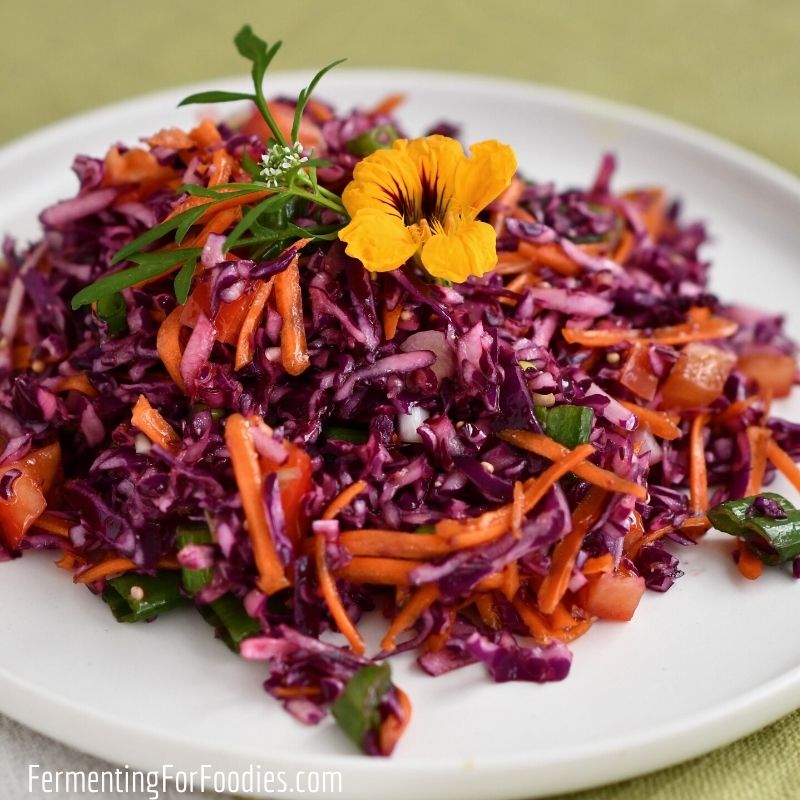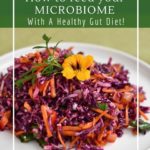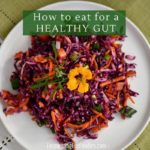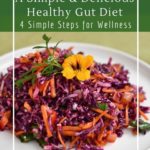Are you looking for a diet to improve your overall health and wellness? This simple healthy gut diet is perfect for feeding your microbiome prebiotics and probiotics.

A Diet For Everyone
I have a theory about why there are so many different diets and cleanses out there… it’s because there are so many different types of people! What works for me might not necessarily work for you. Some people feel healthiest on a heart-smart diet and some people are healthier on a low-carb diet. Ultimately, most diets and cleanses have the same basic goals:
- Improve health and wellness
- Help you maintain a healthy weight
- Give you the energy required to have a productive day
- Assist with long-term health problems
This simple healthy gut diet doesn’t have to replace your current diet. Whether you are keto or vegan, this diet is a way of making sure that you are feeding your microbiome for improved digestion, immunity, and wellness.
Why Feed Your Microbiome?
A Microbiome is the millions of bacteria, fungus, and viruses, that live in and on our bodies. Our bodies are a micro “tiny” biome “home”. Our microbiome covers all the surfaces of our body: our skin, lungs, digestive system… In fact, human cells make up less than half of the cells in our bodies.
There are literally thousands of reasons why you should care about your microbiome.
Here are a few examples of how your microbiome affects your health and wellness:
- It is your first line of defense against infections and supports healthy immune system functioning.
- It supports digestion by helping you break down foods and absorb vitamins.
- Our microbiome protects our skin from sun damage.
- Our mood, stress levels and quality of sleep are all affected by the health of our microbiome.
- What you like to eat is actually affected by the makeup of your microbiome.

A Simple Healthy Gut Diet
This healthy gut diet is designed to be something that you could easily follow every day for the rest of your life. There are only 4 simple steps:
- Eat something probiotic every day. There are a ton of recipes on Fermenting For Foodies for fermented foods and meals that feature probiotic foods. However, I realize this isn’t always easy, so here are some probiotic options for anyone who doesn’t have time to make sauerkraut.
- Prebiotics to feed your gut. A healthy microbiome needs a diet of prebiotics comprised of fiber and resistant starches. Resistant starches are similar to fiber. They pass to the colon undigested and feed the healthy bacteria in our gut. Prebiotic foods include whole grains, nuts, beans and lentils, fresh fruits, vegetables, and cooked, then cooled starches.
- Avoid sugars: If you have a sweet tooth, it’s probably because you have some sugar-loving yeasts and bacteria living in your microbiome. Try to limit or avoid all types of sweeteners, except maybe stevia. Even some low-glycemic sweeteners will feed your sugar-loving flora. So no sugar, honey, maple syrup, coconut sugar, xylitol. Even fruit juice is low in fiber and high in sugar, so grab a piece of fresh fruit instead!
- Good water: If your drinking water is chlorinated, then it could affect your microbiome. Learn how to filter water to remove chlorine and chloramine.
My family has been on a healthy gut diet since 2015, and it has really improved our health.
I will admit that cutting sugar was HARD. Now, I usually bake with whole fruit or date sugar.
If you’re looking for a larger dietary overhaul, then check out The Microbiome Diet Book. I haven’t personally tried it, but it is supposed to be helpful.
Feel free to share your struggles and successes on our Facebook page or in the comment section below!



I never thought someone could make me interested in fermentating but your website has done so. I look forward to starting fermenting vegetables. Some of your recipes sound delicious. My question though is; Doesn’t cooking/steaming food destroy the probiotics?
If you can clear this up for me I would be grateful? Be as scientific as you wish.
Wow! What a compliment, Thank you!
Heating above 40C will kill most probiotics. Freezing isn’t as problematic. Most of my probiotic meals involve adding the fermented food after cooking. Fermenting grains is a great way to breakdown complex carbs making the nutrients in grains more accessible. However, grains are generally cooked after fermenting (like in sourdough), so they are not probiotic. Here’s a blog I wrote a few years ago on the subject: https://www.fermentingforfoodies.com/archives/310 Hope that answers your question Wanda. Cheers, Emillie
I suppose there are recipes for fermenting grains after they’re cooked.
Fermenting grains after their cooked is a bit risky. However, I do short post-cooking ferments on grains that I then eat as a cereal (since they tend to be soft). I nearly always ferment my grains before cooking. I find it helps them break down and cook faster, as well as digest better.
Thank you Emillie for your inspiration and it’s application. You mention from an island or on an island, what island to you live on? Thank you, ET
Glad you like the blog! I live on Vancouver Island. 🙂
Just posting that I found your site super helpful and exciting. Inspiration bubbling up inside me as I write. Thoughts fermenting, ideas brewing. I have a jar of red cabbage miso kimchi just ready, and some fermented asparagus too. Yum.
Yum!